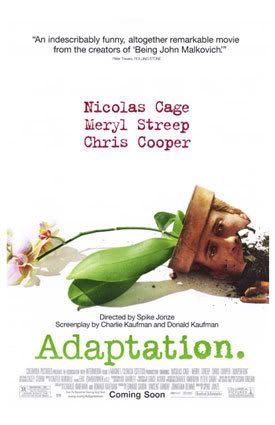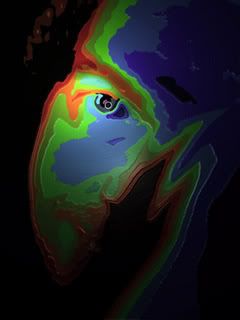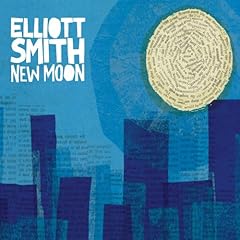ADAPTATION
 suffering from a bit of a busy mind and insomnia, i clambered from bed and attempted to lull myself to sleep with a movie. having not seen Adaptation in a while, i dropped the DVD into the player, and arranged myself comfortably on the couch. unfortunately (or maybe fortunately), the movie didn't provide the effect i was looking for. i stayed up watching it with focus until the final credits.
suffering from a bit of a busy mind and insomnia, i clambered from bed and attempted to lull myself to sleep with a movie. having not seen Adaptation in a while, i dropped the DVD into the player, and arranged myself comfortably on the couch. unfortunately (or maybe fortunately), the movie didn't provide the effect i was looking for. i stayed up watching it with focus until the final credits.
i was eager to see Adaptation when it was first released. its written by Charlie Kaufman and directed by Spike Jonze (the respective writer and director of Being John Malkovich). in the interim between the two projects, i became intrigued with both of them. i bought The Work of Director Spike Jonze as well, which compiles his best music video treatments on one convenient disc. i looked into other films written by Kaufman - a pursuit that led to me discovering the genius of Michel Gondry. Gondry's first feature film was the highly under-rated, Kaufman penned Human Nature. (it was originally planned to have Spike direct, but he was busy with another project and gave the script to his friend and fellow music video director, Michel). Gondry has since made a second movie from a Kaufman screenplay - Eternal Sunshine of a Spotless Mind. maybe you've heard of it.
i'm getting away from myself.
as i laid in a supine position on the couch, awaiting slumber, i took notice of some elements in the story that made it so much deeper than i had thought. i'd always viewed it as a genius script. a screenwriter, given the challenge of adapting a dry, virtually plotless novel about orchids, instead writes about the his own personal inner challenge of adapting a dry, virtually plotless novel about orchids. the movie only deals with the actual content of the original novel slightly. he blurs the borders between reality and fiction wonderfully. Kaufman even makes himself the main character, along with a completely imagined twin brother named Donald (a character made so convincing that both Charlie and the non-existent Donald were jointly nominated for an academy award). the story ends up being less about orchids and more about the mental anguish and struggle of the creative process.
what suddenly dawned on me in this viewing was the aspect that the movie credits the writing to Susan Orlean, Charlie Kaufman and Donald Kaufman. Susan Orlean wrote the novel, charlie wrote the script, so i pondered what Donald's part was. i was aware that he was a fictitious character, but one who is also garnering screen writing attributes. i hadn't given it much thought before.
charlie spends the first two acts dealing with the dilemma of not being able to turn the book into a movie. he's driven by his yearning to do something no one has done before. to use his writing as an art form to create something unique and original. unable to find a means to do so with the source material, and fighting hard against everyone who pushes him to make a "hollywood movie", his writhes in the turmoil of his own self doubt and feelings of failure and inadequacy. meanwhile, his screenwriting brother Donald is an inverted reflection of himself. he looks the same, lives in the same house, has the same job, but has the exact opposite personality. he's outgoing, confident and a bit trite. charlie has a hard time respecting him as a writer since he seeks originality in his work while Donald writes with formulaic hollywood cliches.
Donald submits his generic, hollywood thriller screenplay to Charlie's talent agent, and much to Charlie's disgust, its received with raves over it's brilliance. eventually, Charlie's frustration climaxes. at the urging of his agent, he turns to Donald for advice. from this point on until the end, i believe the writing of the script of the movie that i'm watching was taken over in the real world by Donald Kaufman, the imagined character in the movie. that is, believe it or not, as uncomplicated as i can put it.
almost immediately after Charlie surrenders and asks Donald how he would end the script, the film takes a dramatic right turn. suddenly, the fairly conservative and proper character of Susan Orlean is revealed to be a junkie on some weird drug derived from an endangered strain of orchids. this drug is supplied by John Laroche, the main character of Orlean's novel. this junkie/addict relationship becomes an adulterous love affair. after charlie is caught spying on the pair having sex through a window, he's captured and they plot his murder to save face. Donald, who suddenly seems to have become the hero, saves Charlie from being shot. they escape in a foot chase through the florida swamps, then sneak back to the car in the morning. Donald is shot by Laroche out of nowhere and they take off in the car. again, out of nowhere, they hit a ranger's car head on in a high speed collision and Donald dies as a result. Laroche and Orlean catch up and Charlie, again, fleas on foot into the swamp. just before Laroche has a chance to shoot Kaufman, he's attacked and killed by an alligator. then, rather abruptly, Charlie is back home. the girl he's secretly been in love with tells him she loves him. the movie ends with the song "Happy Together" by The Zombies (the same song Donald mentioned he wanted to use in his movie about a serial killer with multiple personality disorder - also genius since he's basically one of charlie's personalities himself). the music, the characters and even the cinematography changes.
all the things charlie refused to do in his writing appear in the final act. he even states in the beginning that "he wanted to stay true" and not to make it a typical hollywood movie with love affairs and drugs and car chases and guns. the characters spout some cheesey lines. their even a couple shots of Chris Cooper's bare back side and a sex scene. Donald, who was trying to find the fast track to becoming a screenwriter, was taking a course earlier in the film which taught people the formula for making hollywood films.
now, i see this movie on so many more levels. i had previously thought that Charlie had just given up and sold out. that he'd turned toward the usual stereotypes. or, possibly, as a play off of the earlier scene in which he says "little happens in real life" and he's ridiculed by the screenwriting guru for being so very wrong. now i see he just made a cleverly disguised joke about film making. for most of the movie, Donald was seen as a joke. a self assured guy but a goofy, uncreative writer. Charlie demeans his script about a serial killer, his victim and the cop hot on his trail as tired, overused and typical. and the audience agrees. honestly, it sounds like a movie i've already seen a dozen times. a slower movie about the creative journey quickly turns into every cliche in mainstream cinema. all the people who claimed the movie to be be boring but were suddenly enthralled by the climactic ending (and there were A LOT of those people) were really being laughed at. it really is genius.















.jpg)
1 comment:
Once again..."you are shinier than any ant"
I need to rent that movie again.
Post a Comment